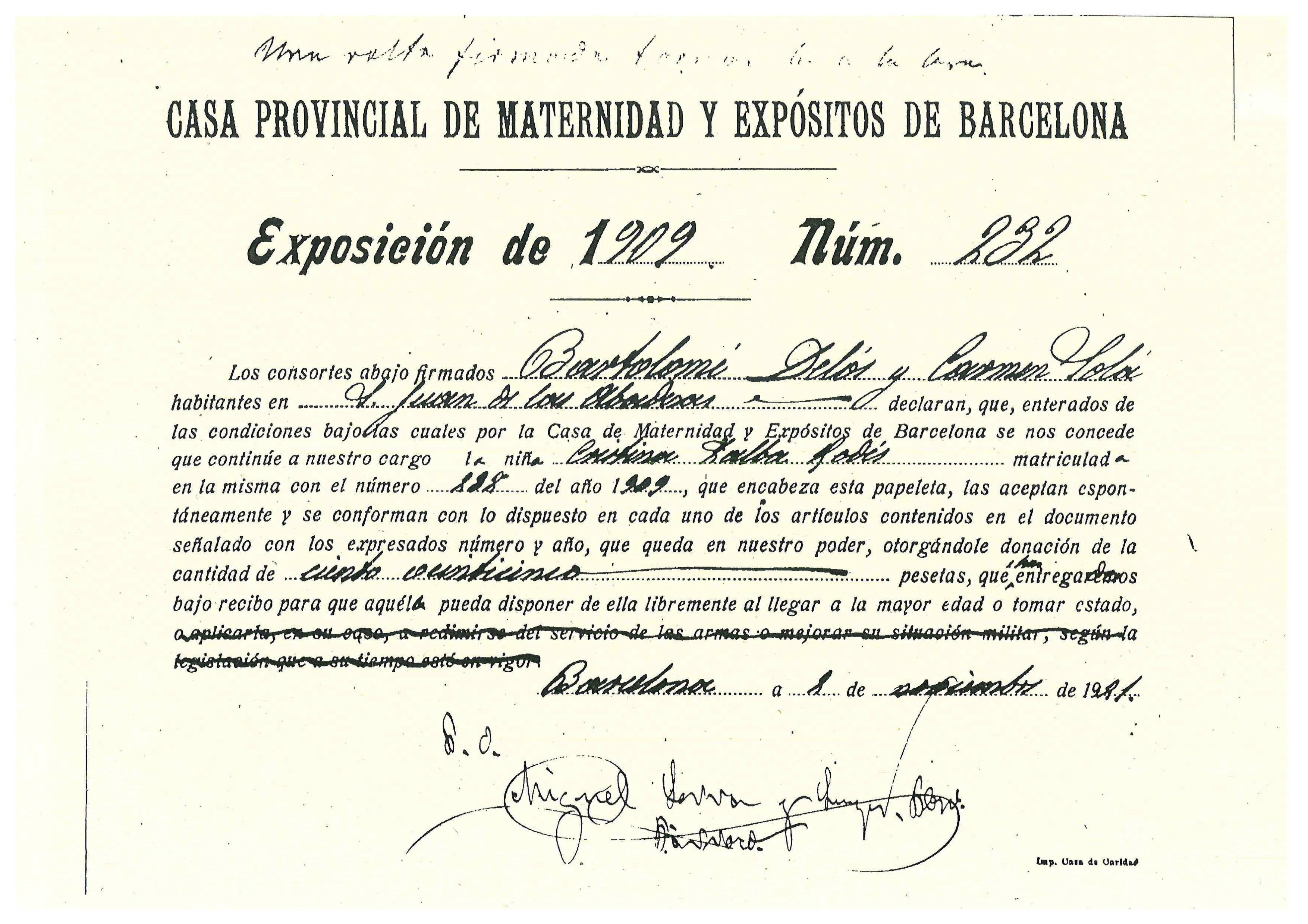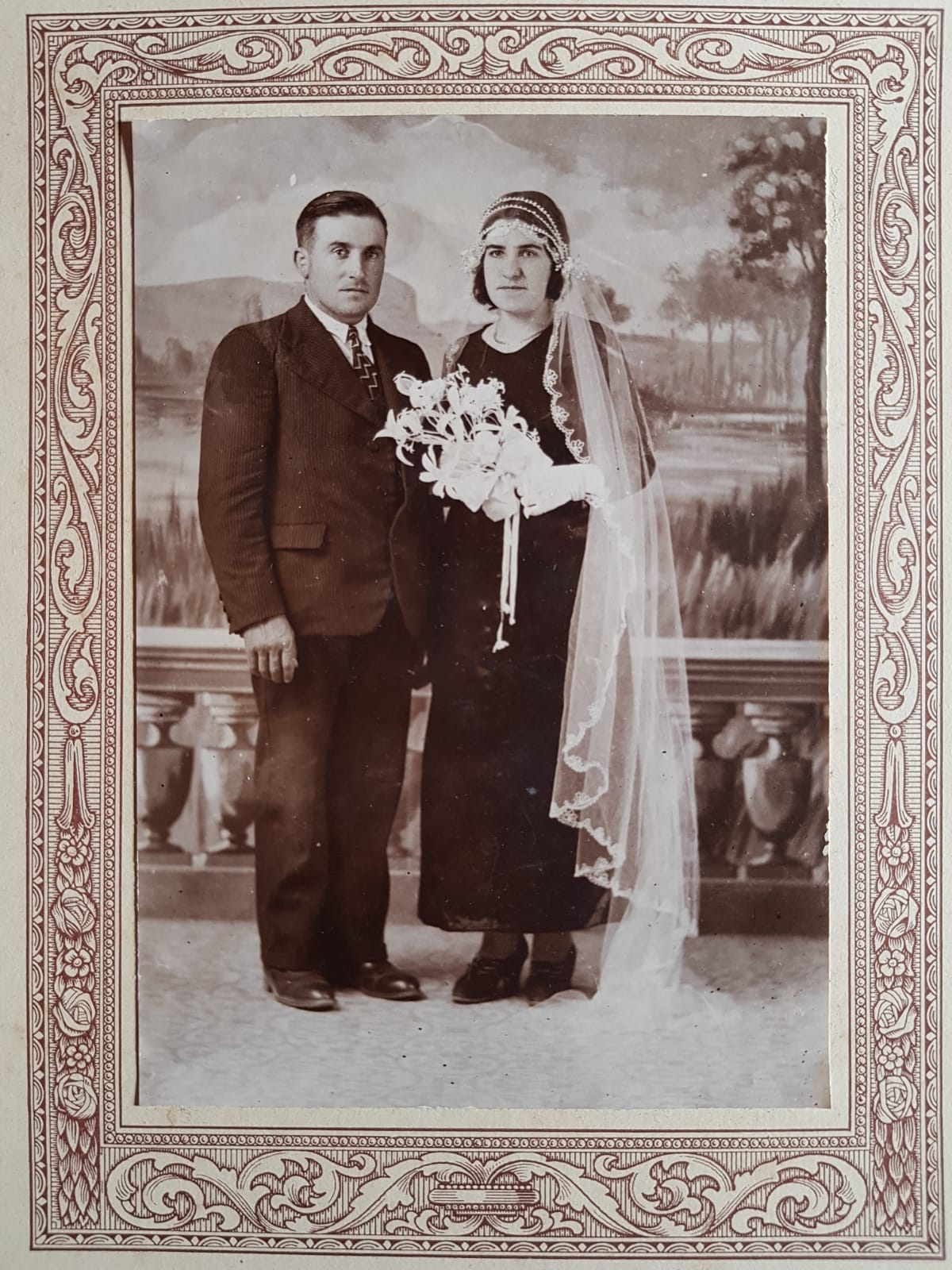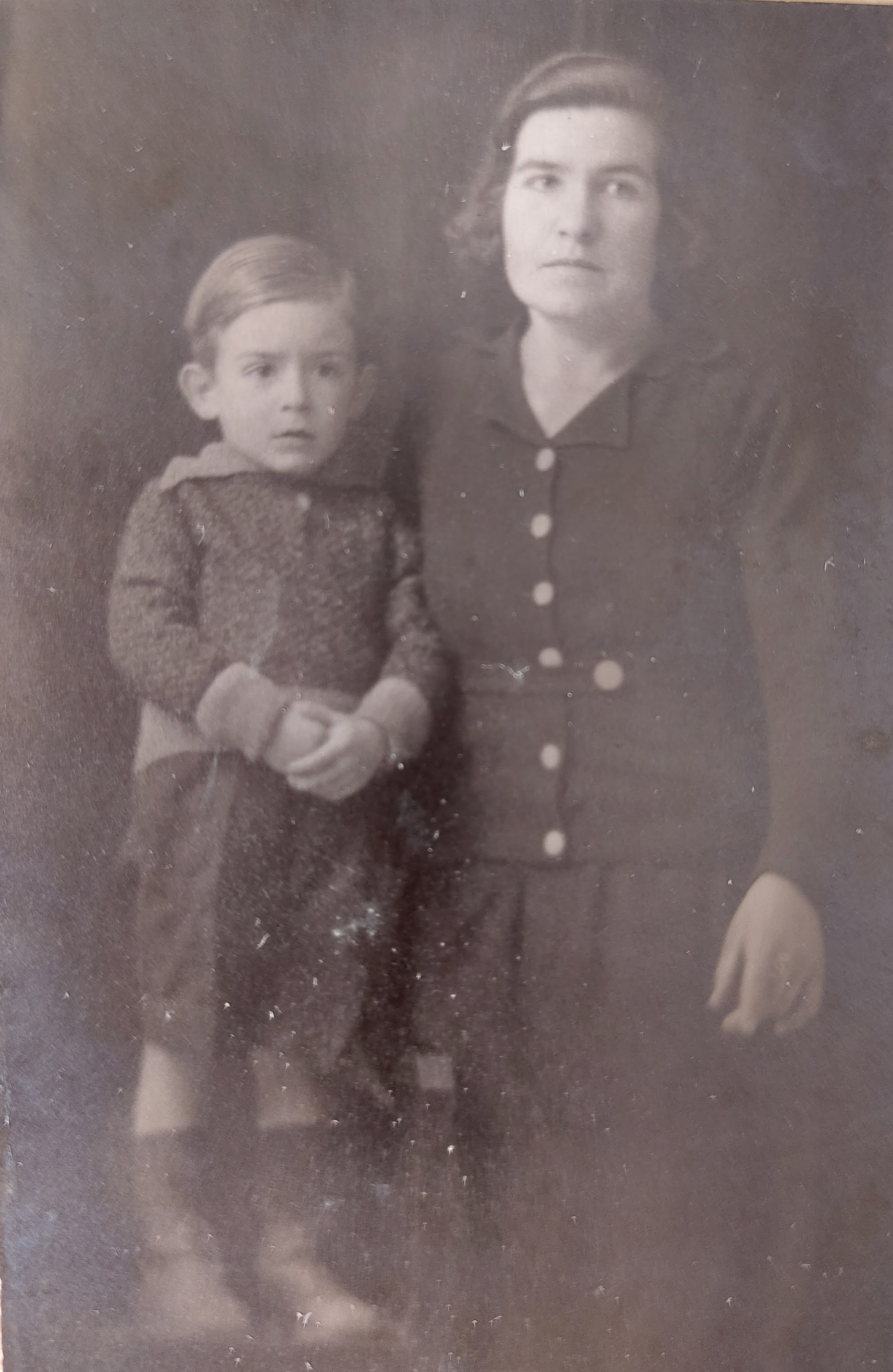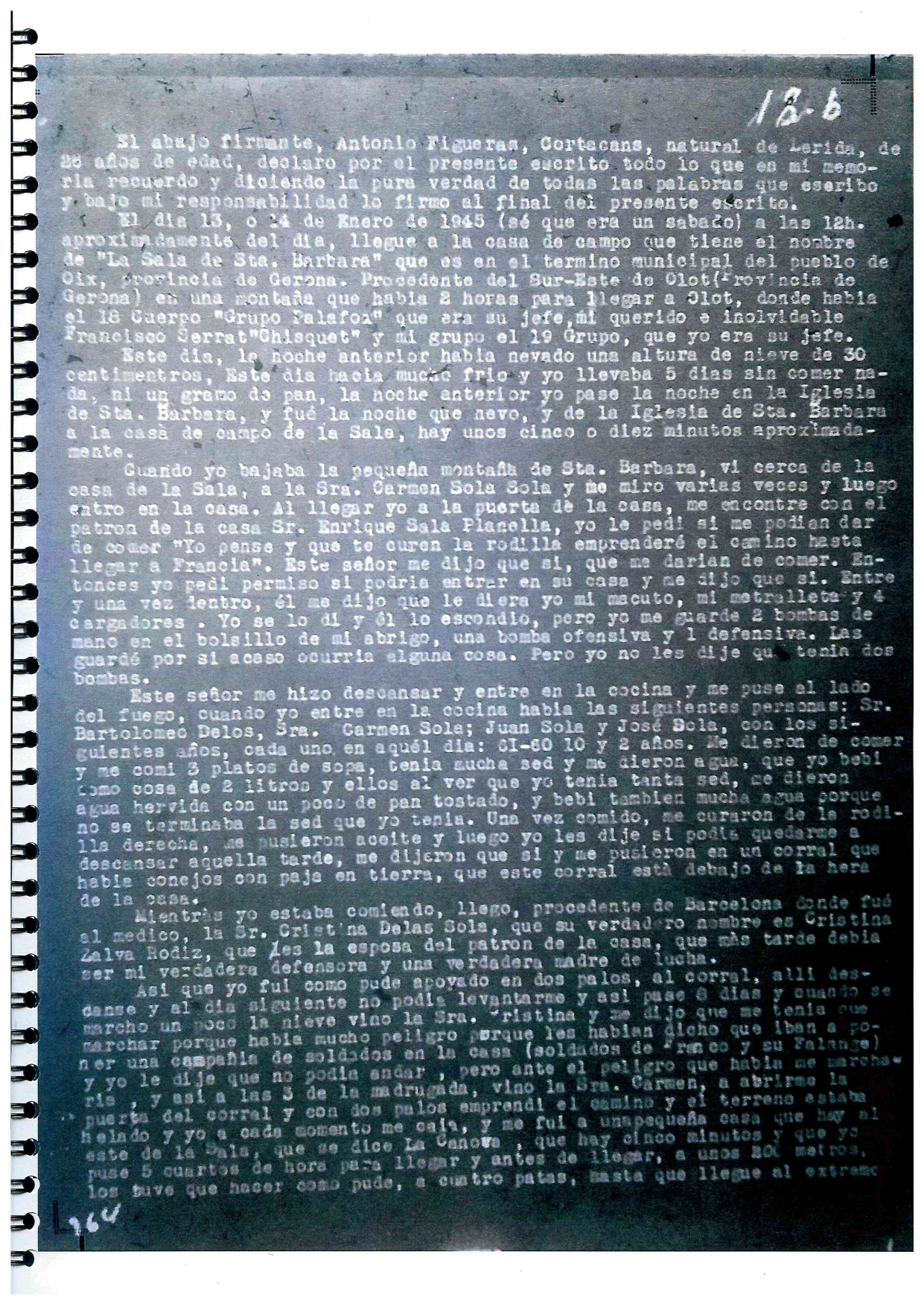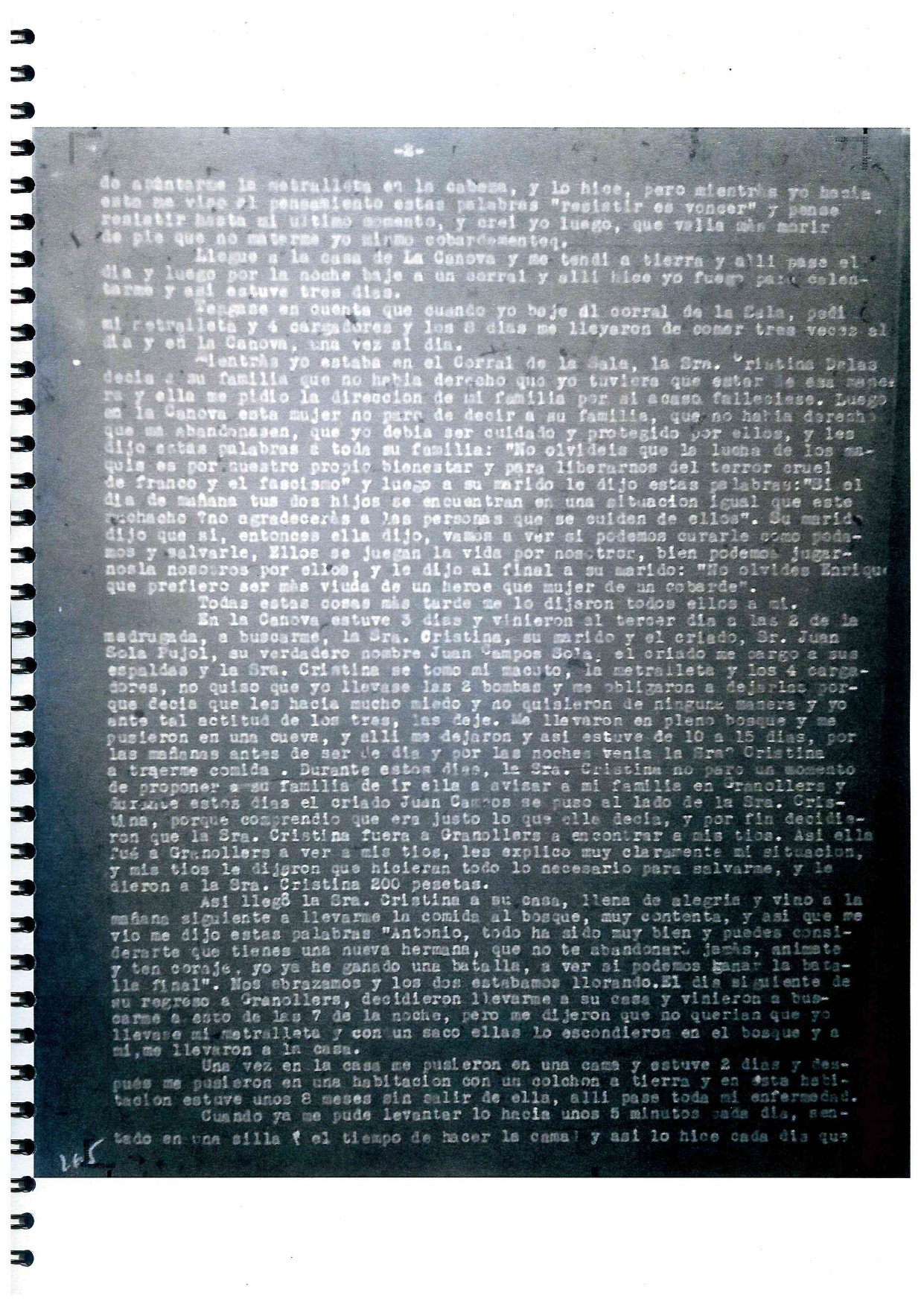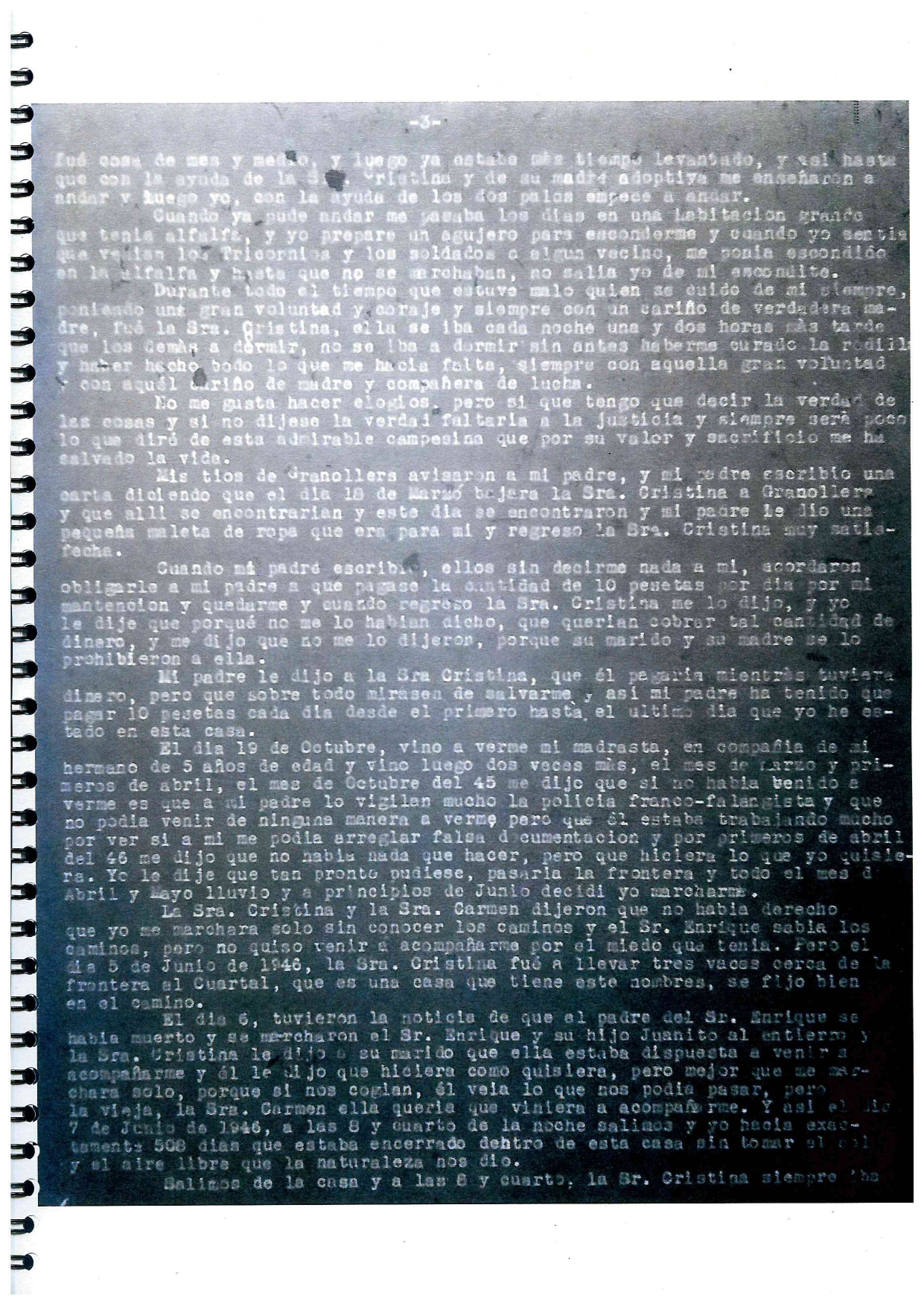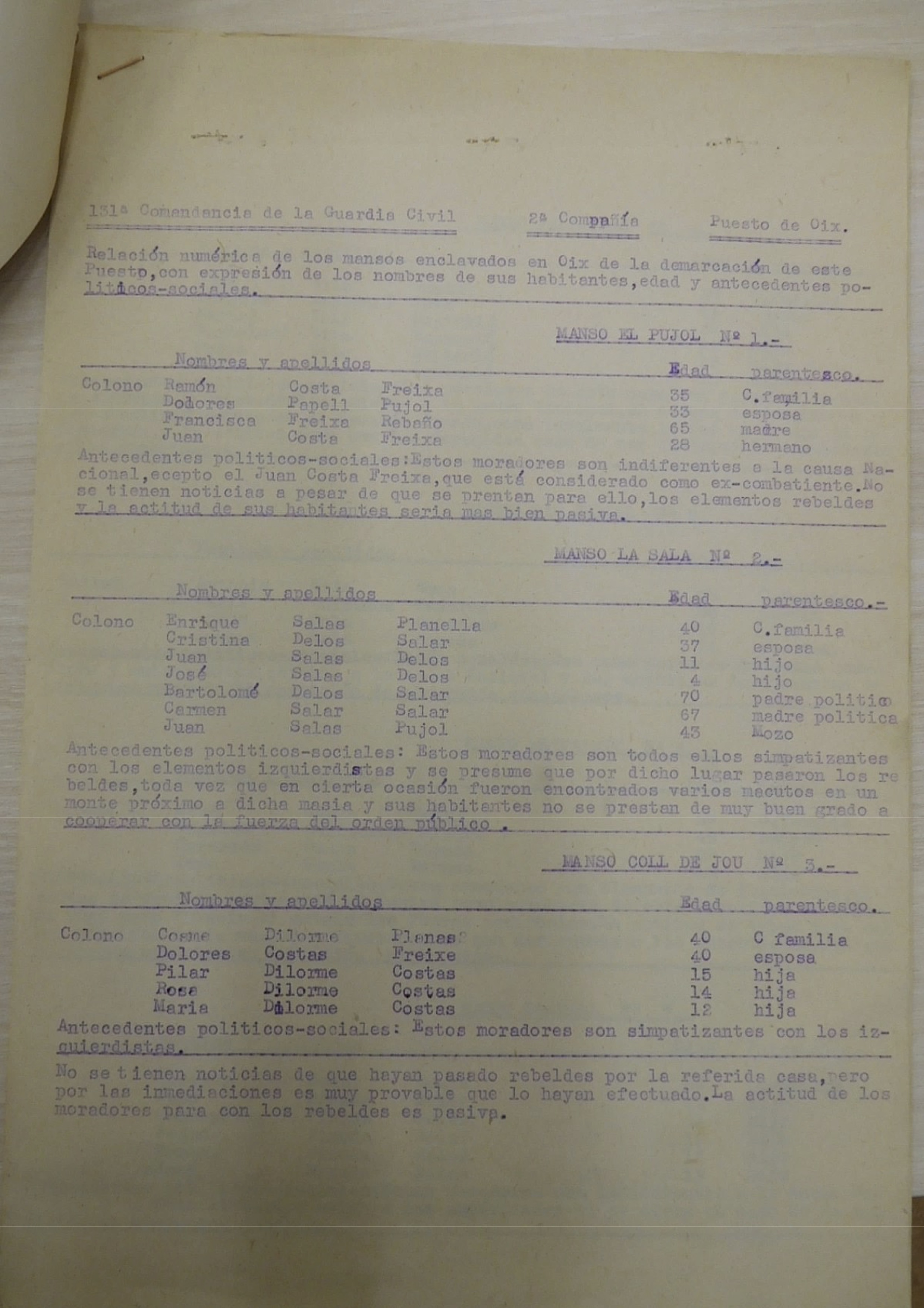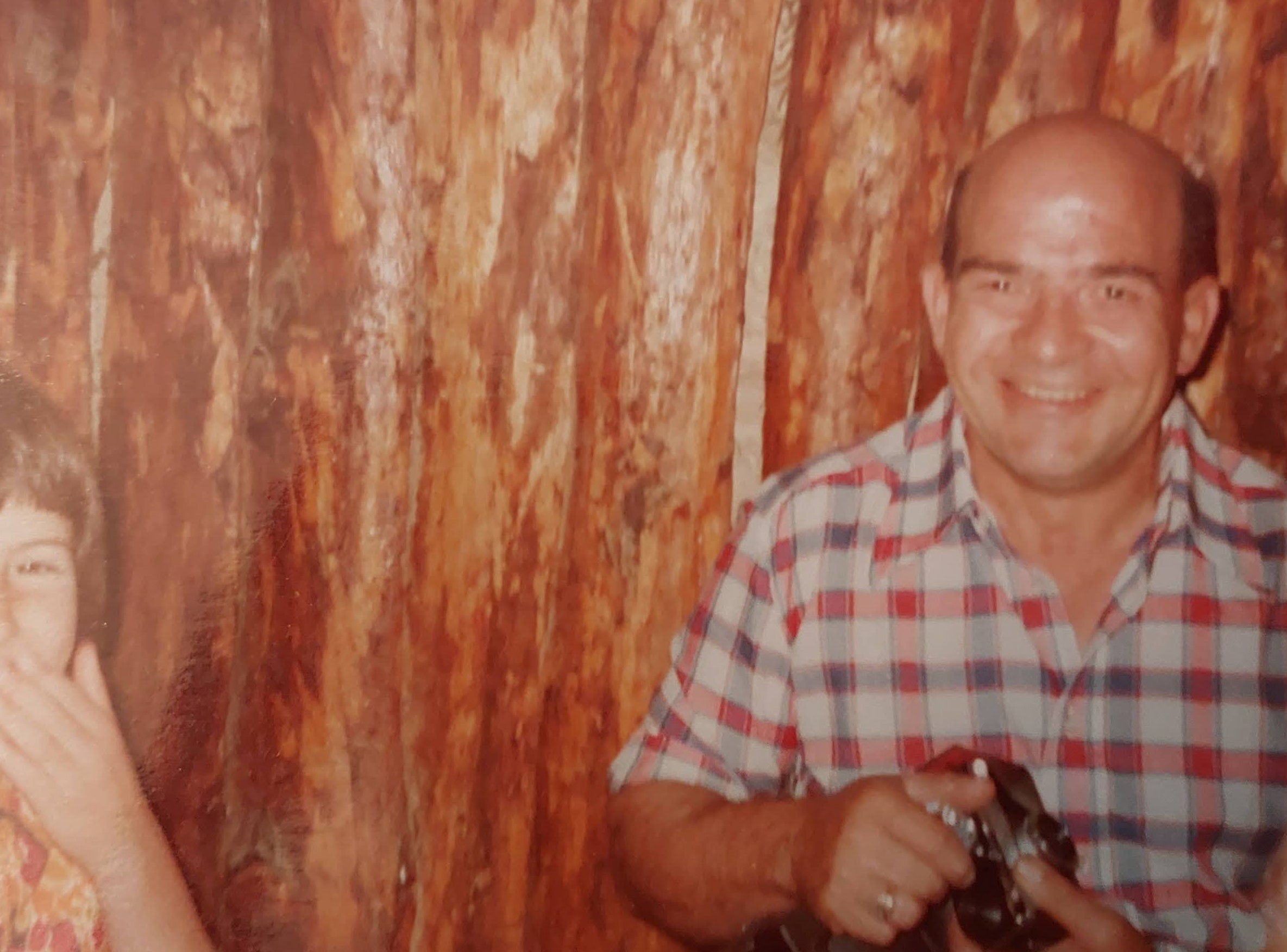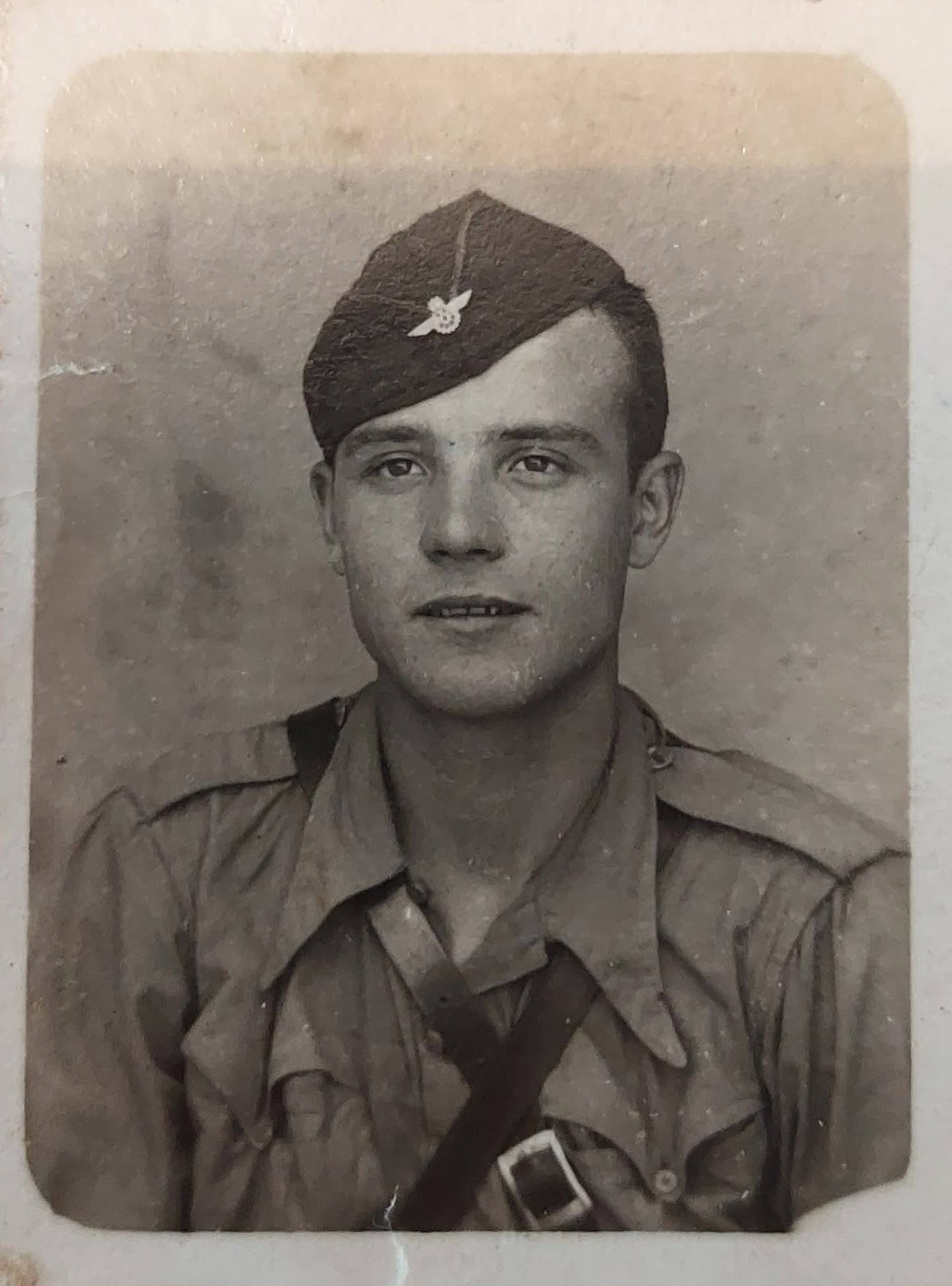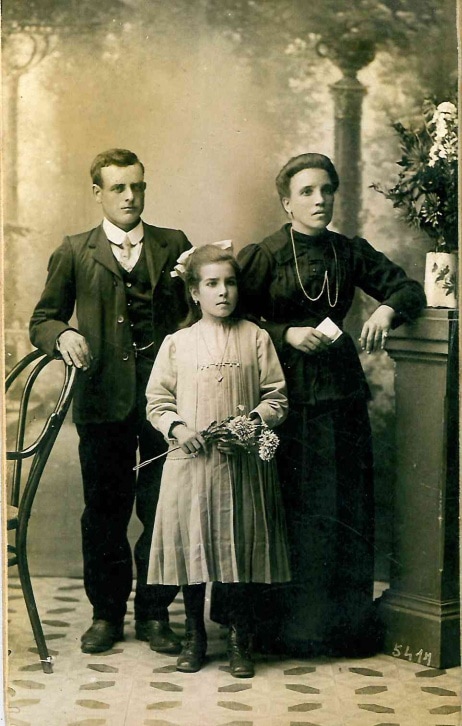- Crispín’s report (donated by Cristina Zalba family).
- Archive Sala Zalba
- Ferrer, Mariona. “Cristina Zalba, la masovera que se jugó la vida para refugiar a un maqui herido” in Diari ARA, 2023.
- Martínez, Guillermo. “Cristina Zalba, la campesina que se jugó la vida por refugiar a un maqui en su casa durante 508 días” a Público, 2023.
- Sánchez, Ferran. El Maquis anarquista: de Toulouse a Barcelona por los Pirineos. Lleida, Ed. Milenio, 2006.
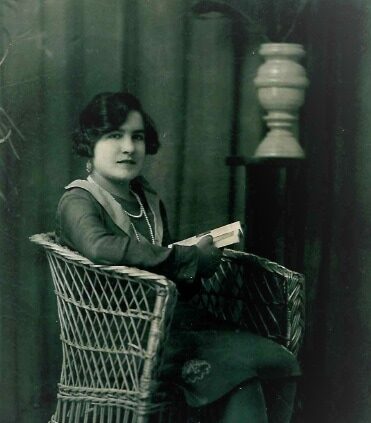
A young anarchist
Cristina Zalba Rodis was born on 7 May 1909 at the Hospital Clínic in Barcelona. The following day, she was abandoned and taken to the Casa de la Maternitat, where a judge gave her a family name. At first, she was taken in by a family from Setcases (Girona) whose mother breastfed her and looked after her until she was 5 years old. But then her adoptive mother died and the family could no longer look after her. The town’s rector managed to have her taken in and finally adopted by the Delós-Solà family of Sant Joan de les Abadesses (Girona). After a few years, the Delós-Solá couple had a biological daughter, Rosita, and Cristina went from being the baby of the house to being the maid. Some years later, when she was 10 or 11 years old, Rosita died from complications from appendicitis.
In 1922, at the age of 13, Cristina started working at the Llaudet textile factory, also known as the Pagès factory, in Sant Joan de les Abadesses. There, she had her first experience with trade unionism and joined the CNT. In 1934, at the age of 25, she married Enric Sala Planella from Sant Pau de Segúries (Girona). Joan, their first child, was born in March 1935.
Surviving the War
With the outbreak of the civil war, Cristina’s husband was sent to the front to fight in the Battle of Ebro with the Republican Army, and she had to face hardship alone. She managed to make the most of her knowledge of herbal remedies and ointments to help her neighbours, especially in the interruption of unwanted pregnancies, while still working in the Colònia Llaudet. Her granddaughter Sònia Sala portrays her as: “a very unconventional woman, very decisive and strong-minded. She was not submissive in the least to her husband and had a mind of her own. She was used to having a voice and a vote at home”. She worked in the factory until 8 February 1939 when, as the Republican troops retreated, it was set on fire and blown up.
After the war, her husband Enric was severely repressed and imprisoned in the Igualada concentration camp, from where he was released at the beginning of 1940. When he returned to Sant Joan les Abadesses, he had a hard time adjusting to the work in the textile factory and so, in October 1940, he went to work as a tenant farmer on the Mas La Sala farm, in the town of Oix (Girona). Cristina also moved in and lived there with her husband, her three children, her adoptive parents and a labourer. The labourer was Joan Camps Solà, Cristina’s brother, who had returned to Catalonia after his exile in France as a member of the PSUC under the false name of Joan Solà Pujol. In this new isolated bordering location, further events led Cristina to give her support to the Maquis and to the anti-Francoist resistance.
Supporting the Maquis
On 31 December 1944, at Mas Puigvert (Sant Iscle de Colltort, Girona), the Guardia Civil ambushed a group of guerrilla fighters looking for provisions. As a result of the confrontation, a Maquis known as Palau was killed whilst another Maquis, a guerrilla called Crispín, was shot in the leg, on his right knee. Although nothing has ever been found out about the third member of the group, everything leads us to believe that he succeeded in escaping and crossed the border into France. Crispín, despite his injury, managed to escape to the mountains. The three Maquis were members of the 19th group of the AGE (Agrupación de Guerrilleros Españoles), the Bordoy group, and they had been infiltrated in a mission to organise armed resistance in Catalonia. Crispín was actually the war name of the 25 year old leader of the Bordoy group, Antoni Figueras Cortacans.
On 13 January 1945, Crispín arrived at the hermitage of Santa Bàrbara de Pruneres. In the afternoon he went to La Sala farmhouse by foot –it was 5 or 10 minutes away from the hermitage– determined to get some food and water and gather some strength to cross the border. He himself wrote in his report to the PCE: “The night before it had snowed, and the storm had left 30 centimetres of snow. It was very cold and I had not eaten anything for five days, not even an ounce of bread”. At La Sala he would meet Cristina who, seeing his wounds, did not hesitate to tend to his injuries so that he could continue on his way. As he himself goes on to say: “Once I had eaten and they had my right knee treated and put some oil on me, I asked them if I could stay and rest that afternoon; they accepted and took me to a pen where they had rabbits on a straw bedding, the pen was under the threshing floor of the farmhouse”.
The following day, when Crispín was supposed to leave for the border, his condition had significantly worsened and he could not walk. Cristina’s family, led by her husband, tried to talk her out of having Crispin stay in the pen, as the farmhouse was on a border crossing and often received visits from the Guardia Civil. It was really dangerous to hide a Maquis there. At that time they had two children, 10 and 2 years old, whose lives were also being put at risk. But Cristina remained firm. Despite her husband’s opposition, and with the sole support of her cousin Joan Camps, she allowed Crispín to stay a few more days.
Under surveillance
Not only were they in a highly guarded border area, but Cristina and her family were totally unaware of the fact that they were already under surveillance by the regime. In fact, as unveiled by recently discovered reports, in 1946 the Guardia Civil had registered them as “sympathisers of left-wing groups; it is presumed that rebels passed through that spot, and on a certain occasion, in a mountain near said farmhouse, several rucksacks were found, but its inhabitants do not seem to be willing to cooperate with the security forces”.
For the first eight days, they kept Crispín hidden in the pen. On the ninth day, following an urgent notification announcing the visit of a group of soldiers from Franco and the Falange, they decided to hide him in a nearby abandoned farmhouse, La Canova. In his report, Figueras recalls how Cristina defended him during this period, trying to bring him back to the La Sala farmhouse: “When I was in La Canova, she kept telling her family that they had no right to abandon me, that I should be cared for and protected by them. And then she said these words to the whole family: ‘Don’t forget that the Maquis struggle is for our own good, to free us from the cruel terror of Franco and fascism’”. She ended up convincing her husband Enric with these words: “If tomorrow your two children find themselves in a situation like the one this man is in, wouldn’t you thank the people who looked after them?” And as Enric nodded, she added: “They are risking their lives for us. We might as well risk ours for them”. Finally, Cristina added: “Don’t forget, Enric, that I’d rather be a hero’s widow than a coward’s wife”. By reasoning in these terms, Cristina managed to have Antoni Figueras come back to the farmhouse three days later. From that moment on, Cristina and Antoni got on so well that the guerrilla fighter would later describe her as a “true warrior’s mother”.
A true warrior’s mother
During the following months, Cristina tended to Antoni’s injuries and looked after him in different rooms of the farmhouse. She would keep him safe, shielded from nosy neighbours and from the Guardia Civil or Franco’s patrols, who often stayed for lunch and spent the night at the farmhouse: “When I felt that the tricorns and soldiers or a neighbour were coming, I would hide in the hay, and until they left I wouldn’t come out of my hideout”.
Figueras faced great difficulties trying to regain full mobility of his leg. In his report he recounts how Cristina “All the time I was ill, the one who always looked after me, relentlessly and with great courage, with the affection of a true mother, was Mrs Cristina. Every night she would go to bed one or two hours later than everyone else, not without first having looked after my knee and done everything I needed”. During this time, Cristina took it upon herself to travel to Granollers (Barcelona), where Antoni’s relatives lived, to tell them that he was still alive. Antoni’s father, who was closely watched by the police because he had his three children exiled for having fought on the Republican side, tried to obtain false identity papers for him, but never succeeded. Antoni’s father’s second wife and their son visited Antoni on two occasions at Mas La Sala.
The best sons of Spain
This situation lasted for 508 days, during which he was able to partially recover. In June 1946, he decided that the time had come to leave the country and cross into France for good. Once again, it was Cristina who helped him, guiding him to the border without her husband’s approval. On 7 June, after a long non-stop night walk during which they walked fifty metres apart from each other in case one of them was captured, they reached the border. There, and according to Antoni’s report, she said to him: “One day you will return and this day will be the day of the glory and the freedom of the Spanish people” and she added: “You guerrillas are the best sons of Spain”. They departed after locking each other in a long embrace. They were never to see each other again. Once in Lamenère (France), Figueras kept writing to the family for a few years, but due to Cristina’s husband repeated refusals, he finally gave up; he also kept corresponding with Joan Camps, the labourer with whom he had built a strong friendship.
Mrs Cristina Delos, a glorious woman
He was fully aware that he would never have survived without Cristina’s determination and help, and he wanted this to be recorded in his PCE reports, where she portrayed her as a true heroine: “Mrs Cristina Delos, her real name Cristina Zalva Rodiz, 37 years old, was born in the Maternity Hospital in Barcelona. During our war of independence she was affiliated to the CNT. She is a woman of great courage, with strong humanitarian feelings and a great mother’s heart, very brave and courageous, like all our glorious women, such as Agustina de Aragón, Aida Lafuente and Lina Odena and others; she has done everything in her power to save my life”.
As for the Sala-Zalba family, they lived at the farm until 1954 when they moved to Castellfollit de la Roca (Girona) to help meet the education needs of their children –a question that was very important for Cristina.
Cristina died on 21 August 2001 at the age of 91 and her story of heroism and commitment has remained unjustly forgotten.
In the spring of 2021, the Amical d’Antics Guerrillers de Catalunya, following the discovery of Antoni Figueras’ report, contacted her family. Cristina’s children and grandchildren were unaware of her story. She had only mentioned it in passing, at the end of the 1980s, to her granddaughter Sònia Sala, but without giving any details or further explanations. She asked her to never tell anyone that they had kept a Maquis hidden at their home, as they could come get them.
In 2022, after this discovery, the Amical Antics Guerrillers de Catalunya started the documentary project 508 dies (2023) which will tell the story of Cristina, “a story of great courage, starring a woman who fought her own fight against Franco’s regime, in her own home”.
Cristina’s granddaughter and great granddaughter, Sònia Sala and Iona Pujol, discovered the story and tried to find Antoni Figueras descendants. They wanted to find out if they were aware of these events and tell them about the documentary project. This resulted in the reunion of two unknown families united by a strong bond that has crossed borders and has also brought Antoni Figueres’ daughters and sons the acknowledgement of their father’s courage.
Sources
